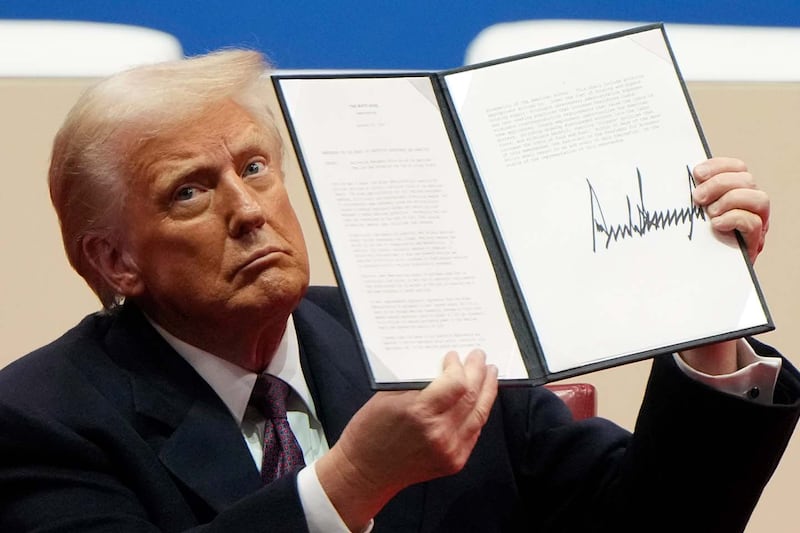Ma Phyu, 31, spent years working to protect ethnic minorities in her native Bago region in central Myanmar. She made her way through university and long hoped to get an advanced degree, but though she was a careful saver, she had to care for her parents and the cost of school was always out of reach.
Finally, last year, Ma Phyu received word that she qualified for a U.S.-funded scholarship program that would cover her tuition, room and board at a public policy program in neighboring Thailand. Upon graduation, she planned to return home to apply her development studies expertise in poverty-hit regions inhabited by ethnic minorities that make up about one-third of Myanmar’s population.
With news of the program’s cancellation last week, however, she is uncertain what will happen to her and other students — many of whom face forced conscription by the military junta should they return to Myanmar. The country is mired in armed conflict triggered by a military coup against the democratic government four years ago.
“Given the existing education gap in the country, these scholarships have been a vital lifeline for those who cannot return home,” she told RFA.
On Wednesday morning, the newly formed Department of Government Efficiency posted to X that a program providing “$45 million in DEI [diversity, equity and inclusion] scholarships in Burma” had been canceled.
Speaking during a signing ceremony in the White House later that day, Trump referred to the scholarships as part of a list of canceled aid projects deemed wasteful by the new administration.
“We also blocked $45 million for diversity scholarships in Burma. Forty-five: that’s a lot of money for diversity scholarships in Burma,” Trump said.

Launched in March 2024, the Diversity and Inclusion Scholarship Program, or DISP, was a five-year project aimed at offering Myanmar students degrees from top universities in Thailand, Cambodia, the Philippines and Indonesia, as well as online courses from the University of Arizona in the United States.
Funded by the U.S. Agency for International Development, or USAID, the scholarship was intended to provide “quality educational opportunities for young community leaders in Burma, especially those from marginalized and vulnerable groups,” as well as boost the capacity of regional universities, according to a press release issued at the launch, which has since been taken down.
RELATED STORIES
Myanmar’s forced conscription: How the junta targets young men for military service
Some 13,700 schools in Myanmar are closed due to civil war
Freeze to US aid hits Cambodia, Laos and Myanmar hard
There are currently 400 students enrolled in universities across the region, with the program expected to reach approximately 1,000 students over the five-year period, according to a source familiar with the scholarship who asked not to be named because of the sensitivity of the issue.
The scholarship had several key aims, the source told RFA, including strengthening democracy in the long run by training future leaders; creating a favorable impression of the U.S. in order to counter China; and improving ties between Myanmar and its regional neighbors.
The word “diversity” reflected the program’s goal to help staunch decades of ethnic conflict by ensuring “all ethnic groups feel they are being treated fairly and have a stake in democracy,” the source explained.
“We really wanted this program to be politically neutral and merit based, but merit based with an eye to including everyone — giving everyone a fair opportunity.”
The Trump Administration has deemed DEI programs illegal and on Jan. 20 terminated them by executive order. The same day, he issued an executive order calling for a 90-day pause in foreign aid so that programs can be evaluated to ensure they adhere to the new administration’s priorities.

It is unclear whether the Burma program was reviewed before its cancellation. USAID did not reply to requests for comment by press time.
Maw Htun Aung, deputy minister of electricity and energy for Myanmar’s shadow National Unity Government, who studied in the U.S. on a Fulbright scholarship in 2010, told RFA the scholarship program appeared to be “hostage due to its name.”
“When a powerful nation steps away from its responsibility, it is detrimental not only to smaller countries like ours but also to the U.S. itself, as it risks weakening its position as the world’s leading power,” he said.
Whatever the reason for the cancellation, the news couldn’t have come at a worse time for those suffering from the impacts of the February 2021 coup, which on Saturday entered its fifth year.
“I see many young people in Myanmar struggling to access education and seeking opportunities for international-level learning,” said Tracy, a scholarship adviser in Myanmar who goes by one name. “The loss of these opportunities is having a deeply negative impact on them.”
Hlwan Paing Thiha has been pursuing a master’s degree in public affairs in Thailand on a DISP scholarship. He hoped to attain a doctorate and then return home as a teacher. The announcement of cancellation has thrown his future plans into disarray and much of his cohort has been panicking.
“I have to say it’s quite a blow,” he told RFA in an interview. “The uncertainty for the current students is where they’ll get their tuition for the next semester. We all come from different backgrounds. We’re minorities. So, I think the biggest challenge is going to be for those who can’t afford to go [study] on their own.”
